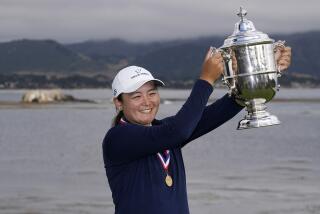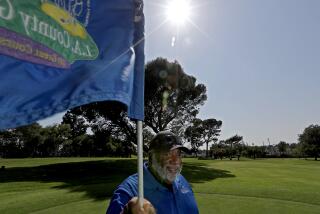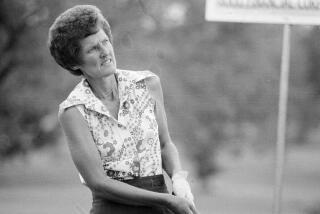LPGA Looks Better After Votaw’s Run
- Share via
Ty Votaw is 43, looks 17 and acts like someone who for the last six years has been running the LPGA. In other words, he has been so busy doing his pitches as a salesman, he probably should have lost his voice a long time ago.
This is Votaw’s farewell season on the LPGA Tour. He has already announced he will walk away from the job of commissioner at the end of the year. Because no one has exactly broken down the door trying to take his sweet corner office right away, it shows just how difficult a job he has.
How anyone will view Votaw’s tenure at the top is going to depend on the answer to one simple question:
Is the LPGA better off now than it was when he took over in 1999?
The answer is even simpler. Of course it is.
Votaw, who came on board at the LPGA as a lawyer in 1991, has the uncanny knack of being able to recite statistics with the delivery of a politician. And while it’s easy to get numbers to do just what you want them to do, it’s hard to argue with these.
The average prize money for a tournament is up from $800,000 to $1.4 million.
There are 30 tournaments with prize money of at least $1 million, compared to 12 in 1999.
Total prize money from 1999 through 2005 is up 63.5%, from $170 million to $278 million, compared to the previous seven-year period.
It’s also true that the hallmark of Votaw’s career at the head of the table in the LPGA boardroom, at least in the view of the public and the media, may be less about money and more about looks.
In 2002, Votaw introduced to a semi-skeptical group of players a five-year business plan called “Fans First” that had a bunch of parts to it that nobody remembers -- except the one about the players dressing up and looking better.
Imagine a commissioner of a major pro sports league suggesting that the athletes try to turn on some of that star power as it relates to appearance, and behavior toward fans.
If that turns out to be the sum of Votaw’s legacy with the LPGA, well, he’s still on the plus side.
Of course, what happened to the LPGA while Votaw was at the helm wasn’t always his doing.
Votaw didn’t create Annika Sorenstam, he inherited her. She was already the biggest star in the LPGA and she wasn’t all that pleased with the “Five Points of Celebrity” agenda because she felt that being herself was good enough.
Also, Votaw didn’t invent the global mix of the LPGA Tour, including the influx of the South Korean players led by Se Ri Pak, the first victories last year by a Mexican (Lorena Ochoa) and a Filipino (Jennifer Rosales), and the first player from mainland China, Li Ying Ye.
It happened on his watch. What Votaw did was take advantage of Sorenstam and the international players and market them to sponsors, tournaments, the media and the public.
And this week at the Kraft Nabisco Championship, the LPGA’s first major of the year, consider all the young players in the field: Paula Creamer, Morgan Pressel, Aree Song, Michelle Wie, Jane Park, Brittany Laing, Julieta Grenada and Ai Miyazato.
Votaw didn’t just sit back in his leather chair, snap his fingers and come up with the concept of younger players in tour events, either, but he’s savvy enough to know that the media and the fans dig that stuff.
The fact that Votaw recognized the trend qualifies him as a visionary in this brand of sports.
So now that he is inching his way out the door, Votaw can take pride that attendance is up, viewership is up and, for the first time, every LPGA tournament will be televised this year.
He should also be pleased that there haven’t been any steroids or strikes or ugly scenes during his time at the LPGA.
Votaw compared the LPGA to the NHL, which is in the middle of a bitter labor dispute, to the steroid scandal in baseball and also to the NBA, with “players going into the stands to show how they really feel about the fans.”
There are still nine months to go in his farewell tour, but unless something unexpected goes really haywire, Votaw’s legacy isn’t going to change. He took over a niche sport and presided over the greatest period of growth in its history.
Where it goes from here is anybody’s guess, but at least there’s a blueprint that Votaw left. Now that those who make the LPGA’s decisions are trying to find the next in line, they’re probably missing him already.
More to Read
Go beyond the scoreboard
Get the latest on L.A.'s teams in the daily Sports Report newsletter.
You may occasionally receive promotional content from the Los Angeles Times.










